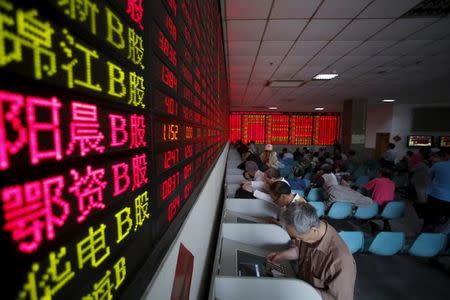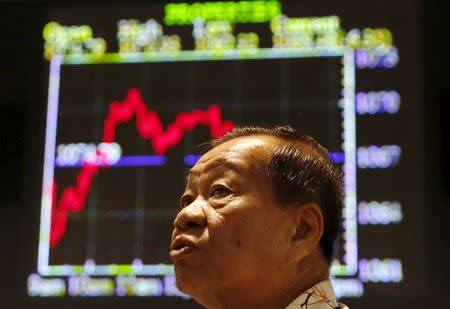In This Article:
By Andrew Galbraith and Winni Zhou
SHANGHAI (Reuters) - China's shares tumbled in a broad sell-off, and the yuan weakened on Wednesday after the United States threatened further import duties on Chinese goods in a sharp escalation of the trade conflict between the world's two biggest economies.
Washington's latest move, which comes just days after both countries imposed tit-for-tat tariffs on $34 billion of each other's goods, ups the ante in a heated trade dispute that has rattled global financial markets.
The Shanghai Composite index was 1.9 percent lower at the midday break, while the blue-chip CSI300 index also slumped 1.9 percent.
Investors are particularly worried the trade row could harm an already slowing Chinese economy in a blow to global investment and growth.
The yuan's decline also prompted heavy selling of airline shares amid fears that a falling currency could add to fuel costs and the debt-servicing load of companies with dollar-denominated debts.
China Southern Airlines, Air China and China Eastern Airlines all fell more than 5 percent. The broader CSI300 transport sub-index was down 2.9 percent.
Hong Kong's Hang Seng index was 1.6 percent lower at 0330 GMT.
Investors were wary of China response to the latest U.S. tariff threat, as the country's assistant commerce minister said the proposed U.S. duties harm the World Trade Organization system and globalisation.
"It is impractical for China to match tariffs by quantity," said Frances Cheung, head of Asia macro strategy at Westpac in Singapore. "If the U.S. goes ahead with more, China needs a combination of tools and it is prudent to guard against downside risk to growth too."
She said the downside risk to growth mainly stemmed from trade tensions.
RISK TO EXPORTS
The threat of additional tariffs on $200 billion worth of goods "would mean that around half of Chinese exports of goods to the U.S. would face significant U.S. punitive tariff measures," Rajiv Biswas, Asia Pacific Chief Economist at IHS Markit, said in a note.
"China's export sector will therefore suffer a significant deterioration in export competitiveness to the U.S. compared to other emerging markets' manufacturing exporters."
The trade war anxiety extended to China's onshore yuan, which followed its offshore counterpart lower. Traders said they were keeping an eye on the key 6.7 per dollar level as pressure mounted on the currency.
However, the market wasn't aggressively testing that level due to concerns it could prompt intervention, they said.


